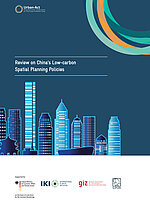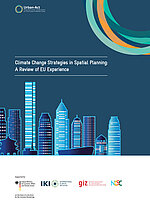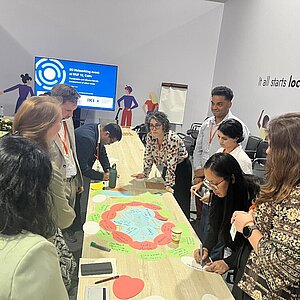Integrated Climate Action for Low-Carbon and Resilient Cities in Asia and the Pacific

IKI's Urban Act project co-organised a side event on low-carbon and resilient cities as part of the Asia-Pacific Forum.
In order to integrate climate action into urban development, multilateral governance, uptake and upscaling of innovative project ideas, capacity development of government authorities on planning, project preparation and the mobilization of resources must be systematically addressed.
The integration of climate action in the Asia-Pacific region has been emphasized as a key intervention to spearhead climate-resilient development, with the IKI Urban-Act regional project partnership as one of the enablers for its operationalization.
Based on this, the IKI Urban-Act project together with UNESCAP and UCLG-ASPAC hosted a side event on Integrated Climate Action for Low-Carbon and Resilient Cities at the 10th Asia-Pacific Forum on Sustainable Development (APFSD).
Addressing Nationally Determined Contributions (NDCs) and Sustainable Development Goals (SDGs) for city climate action
APFSD 10 brought together experts, policymakers, and practitioners to discuss key regional and national actions and partnerships to localize the NDCs and SDGs for city climate action. The objective was to support cities’ interventions to lower their carbon emissions while addressing the increased frequency and intensity of climate-related hazards, especially for vulnerable and marginalized urban residents.
During his opening remarks, Mr. Hans-Ulrich Südbeck, Germany’s Permanent Observer to ESCAP and Deputy Ambassador to Thailand emphasised that “climate-related hazards are causing economic loss, disruption of basic services and destruction of key infrastructures in cities of the Asia-Pacific region, which is affecting the well-being of urban residents, especially the vulnerable and marginalized communities. Recognizing sustainable and climate-sensitive urban transition offers co-benefits to the society, ecosystem, and the economy.” He further added that Germany provides funding for the regional Urban-Act project to assist national and sub-national governments in its partner countries with identifying concrete climate and sustainability measures and provide a conducive environment for climate-sensitive urban development. Support for dialogue and cooperation through regional networks will be carried out to promote knowledge exchange and capacity development in the pilot countries.
Regional partnership for low-carbon development
During the panel discussion on regional and national actions to localize the NDCs and the SDGs for city climate action, Assistant Secretary Francisco R. Cruz (Department of the Interior and Local Government of the Philippines), shared that the regional partnership will provide important support. These include enabling local governments to foster low-carbon development and integrate disaster risk management and climate change adaptation into their city plans while at the same time promoting participatory governance and prioritizing vulnerable stakeholders and highly climate-impacted sectors. He was supported by the other panellists who pointed out that through the regional partnership, they can leverage the expertise of the sub-regional cooperation to invest in concerted efforts to expedite climate action in the cities, upscale climate projects, establish a regional knowledge network to address common issues and develop an action plan that is informed and based on evidence.
Finally, the session ended with reflections of Ms. Norliza Hashim, CEO of Urbanice Malaysia and Mr. Helmi Abidin, Resilience Coordinator at UCLG-ASPAC on key takeaways from the 7th Asia-Pacific Urban Forum (APUF-7). The discussions emanating from the forum endorsed using resilience as a co-active tool in urban governance to achieve sustainable urban development and reimagining cities keeping future climate scenarios in mind. There were calls for integrating resilience strategies into urban planning, developing national and local adaptation plans, and building on local nature-based solutions to achieve the global climate and urban agenda.
Outlook
The Urban-Act project will work to synchronize its efforts with strategic partners to link the needs of local governments and align them with national targets. The Asia-Pacific Local Government Coordinating Body (APLG) will be hosting the Local Government Assembly in October 2023 to bring together mayors to discuss their commitments to achieve the global agenda in the lead-up to APUF-8 in Suwon City, Republic of Korea.
The link has been copied to the clipboard
Contact
IKI Office
Zukunft – Umwelt – Gesellschaft (ZUG) gGmbH
Stresemannstraße 69-71
10963 Berlin







